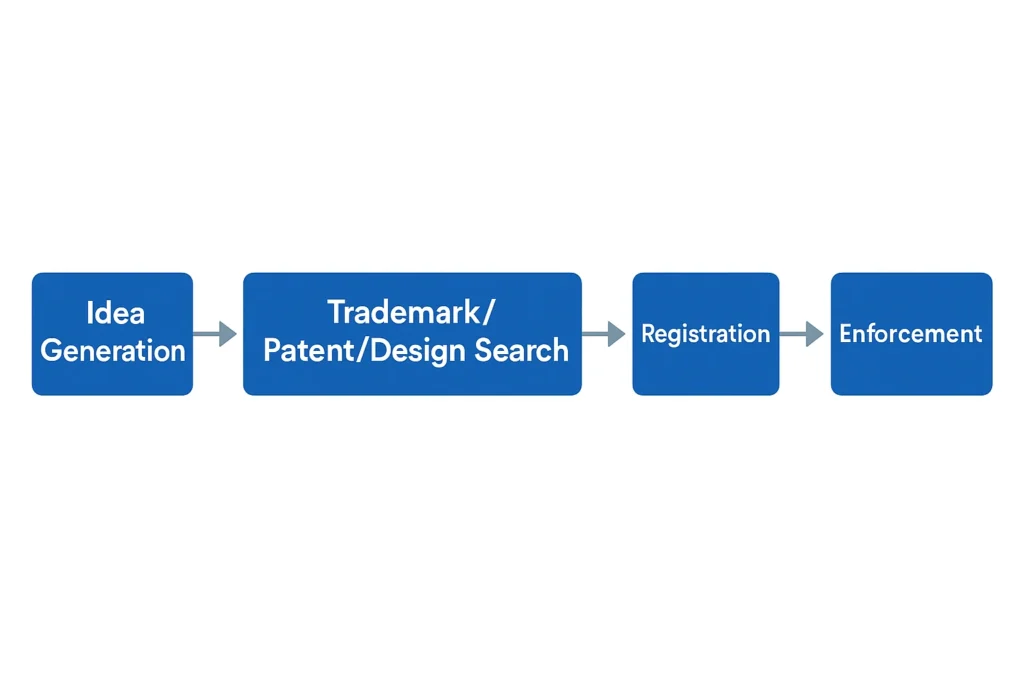Introduction: Why IP Law for Startups Is a Game-Changer
In India’s fast-growing startup ecosystem, innovation is the heartbeat of success. But what truly sets a startup apart is not just a great idea, but the ability to protect and leverage that idea. This is where IP Law for Startups becomes a crucial pillar in your entrepreneurial journey. Intellectual Property (IP) isn’t just a legal formality—it’s your shield, your competitive edge, and often, your most valuable asset.

In this comprehensive guide, we’ll demystify IP Law for Startups, show you how to build a robust IP strategy, and help you avoid common mistakes that can cost you dearly. Whether you’re building a tech unicorn, a consumer brand, or a design-centric venture, understanding IP Law for Startups is your first step toward sustainable growth and investor confidence.
Table of Contents
What Is Intellectual Property in the Context of Startups?
Startups thrive on innovation, creativity, and unique value propositions. Your brand name, logo, technology, content, and even your business processes can be protected under IP Law for Startups. Here’s what typically qualifies as intellectual property in a startup:
- Brand names and logos
- Custom software or hardware designs
- Proprietary algorithms and processes
- Marketing content and website copy
- Product designs, packaging, and formulations
- Trade secrets such as customer lists or business strategies
Each of these assets can be protected under different branches of Indian IP law, forming the foundation of your startup’s competitive advantage.

Why Is IP Law for Startups So Crucial?
IP Law for Startups is not just about legal compliance. It’s about:
- Building Brand Value: A registered trademark or unique design builds trust and recognition.
- Attracting Investment: Investors want to see that your innovation is protected and enforceable.
- Market Exclusivity: Patents and designs can keep competitors at bay for years.
- Monetization: IP can be licensed, sold, or used as collateral for funding.
- Long-Term Survival: Without IP protection, your ideas can be copied, modified, or outright stolen.

Types of Intellectual Property Most Relevant to Startups
1. Trademarks
Protects: Brand names, logos, slogans
Relevant Law: Trade Marks Act, 1999
Why it matters:
Your brand is often your startup’s first impression. Trademark registration under IP Law for Startups ensures that your unique name, logo, or tagline cannot be legally used by others, safeguarding your brand identity.
Key Tips for Startups:
- Perform a trademark availability search on the IPIndia portal.
- File under the TM-A form.
- If you plan to go global, consider international registration via the Madrid Protocol.

2. Patents
Protects: Inventions and technical innovations
Relevant Law: Patents Act, 1970
Why it matters:
If your startup is developing new technology, patents offer market exclusivity for up to 20 years. This is a core aspect of IP Law for Startups for tech-driven ventures.
Patent Criteria:
- Novelty
- Inventive step
- Industrial applicability
Startup-Friendly Schemes:
- Expedited examination for startups
- Reduced government fees
Note: Pure software or algorithms are generally not patentable in India, but hardware-software integration may qualify.
3. Copyright
Protects: Creative and original expressions (software code, designs, content)
Relevant Law: Copyright Act, 1957
Why it matters:
From website content to UI/UX design, copyright protection ensures your original material can’t be copied without your consent. While registration is not mandatory, it serves as strong evidence in case of disputes.
4. Industrial Designs
Protects: Aesthetic shape, pattern, or configuration of an article
Relevant Law: Designs Act, 2000
Why it matters:
For consumer-product startups, unique packaging or product shapes can be a major differentiator. Registering your designs under IP Law for Startups helps you stand out and prevents imitation.
5. Trade Secrets
Protects: Confidential business information, formulas, processes, customer lists
Why it matters:
Not all IP is registered. Some of your most valuable assets—like secret recipes, algorithms, or business strategies—are best protected as trade secrets. Use NDAs, access restrictions, and robust internal policies to safeguard them.
Building an IP Strategy: The Startup Roadmap
A common mistake is treating IP as an afterthought. Instead, make it a core part of your business plan. Here’s how to build a winning IP strategy under IP Law for Startups:

Step 1: Conduct an IP Audit
- List all potential IP assets (brands, inventions, content, designs, trade secrets).
- Identify which assets are core to your business and which are nice-to-have.
Step 2: Prioritize What to Protect
- Focus on assets that drive your competitive advantage.
- Consider budget, business goals, and market expansion plans.
Step 3: Register and Document
- Register trademarks, patents, and designs as early as possible.
- Document the creation and ownership of all IP, including software and content.
Step 4: Monitor and Enforce
- Set up alerts for similar trademarks or potential infringements.
- Take swift action against copycats to maintain your rights.
Step 5: Review and Update
- Regularly review your IP portfolio as your business evolves.
- Update registrations and agreements as needed.
Step-by-Step: How to Register IP in India for Startups
Trademark Registration
- Conduct a trademark search on IPIndia.
- File TM-A form online.
- Respond to examiner’s objections, if any.
- Trademark is advertised in the journal.
- If uncontested, registration certificate is granted.

Patent Filing Process
- Draft a provisional patent application.
- File at the Patent Office Portal.
- Request examination (Form 18).
- Respond to examination report.
- Patent is granted or rejected.
Copyright Registration
- File Form XIV at the Copyright Office Portal.
- Attach a sample of the work and pay the fee.
- Wait for objections and resolution.
- Obtain registration certificate.
Industrial Design Registration
- Submit application with drawings and description.
- Undergo examination and respond to objections.
- Design is published and registered if approved.
Agreements and IP Ownership: Avoiding Costly Disputes
One of the most overlooked aspects of IP Law for Startups is clear ownership. Disputes between co-founders, employees, or contractors can destroy a startup. Here’s how to protect yourself:
- Founders’ Agreement: Clearly define IP ownership and assignment.
- Employment Contracts: Include robust IP assignment and confidentiality clauses.
- Vendor/Contractor Agreements: Ensure all work-for-hire IP is assigned to the company.
- NDAs: Use for all sensitive discussions and collaborations.
Common IP Mistakes by Startups (and How to Avoid Them)
| Mistake | Solution/Best Practice |
|---|---|
| Not auditing IP assets | Conduct regular IP audits |
| DIY filings without expert help | Consult IP professionals |
| Using unlicensed third-party content | Track and verify all licenses |
| Poor documentation/agreements | Use robust, customized legal agreements |
| Not monitoring/enforcing IP | Set up regular IP monitoring and enforcement |
| Ignoring trade secrets | Implement confidentiality and access controls |
| Under-prioritizing key IP | Focus on IP critical to business goals |

Cost-Effective IP Strategies for Startups
- Leverage Government Schemes: Use Startup India’s 80% rebate on patent fees and expedited examination.
- File Provisional Patents: Secure an early filing date at lower cost.
- Prioritize Core IP: Protect what matters most first.
- Use Online Tools: For searches, monitoring, and basic filings.
- Negotiate with IP Professionals: Some offer startup-friendly packages or deferred fees.
Monitoring and Enforcement: Your IP Needs Protection Beyond Registration
Registering your IP is just the beginning. Under IP Law for Startups, you must:
- Regularly monitor for potential infringements (use Google Alerts, IPIndia databases, etc.).
- Send cease-and-desist notices promptly when infringement is detected.
- Be prepared to enforce your rights through legal action if necessary.
Using Third-Party Content and Open Source: Avoid Legal Landmines
Many startups unknowingly use copyrighted images, code, or content without proper licenses, risking lawsuits and investor mistrust. Always:
- Check licenses for all third-party content.
- Document permissions or purchase licenses.
- For open-source software, comply with license terms and avoid mixing incompatible licenses.
Government Initiatives Supporting IP Law for Startups
1. Startup India Initiative
- IP facilitation through registered agents
- 80% rebate on patent filing fees
- Fast-track patent examination

2. NIPAM (National IP Awareness Mission)
- IP literacy for entrepreneurs and academia
3. CIPAM (Cell for IPR Promotion and Management)
- WIPO collaboration for global IP strategies
Landmark Indian Cases Involving Startup IP
- Zostel vs. OYO: Ongoing trademark and brand rights dispute.
Lesson: Register your trademark before pitching or collaborating. - Practo vs. Qikwell: Dispute over trade secrets after employees joined competitors.
Lesson: Enforce strong non-compete and IP clauses in employment contracts.
Visual Map of the IP Lifecycle for Startups
Idea Generation → IP Audit → Trademark/Patent/Design Search → Registration → Monitoring → Enforcement

State-Wise Filing Trends and Startup Hubs
India’s IP filings are concentrated in Bengaluru, Delhi, Mumbai, and Hyderabad. These hubs offer better access to IP professionals and government support.
Important PYQs – UPSC & Judiciary Exams
UPSC Law Optional
- Examine the role of intellectual property in promoting innovation in India’s startup ecosystem.
- Discuss India’s compliance with TRIPS and its impact on domestic entrepreneurship.
Judiciary Exams
- Explain the essentials of a valid patent under the Patents Act, 1970.
- What constitutes trademark infringement? Discuss with case law.
- What is the process of copyright registration under Indian law?
Internal:
External:
Conclusion: IP Law for Startups Is Your Survival Toolkit

In today’s hyper-competitive landscape, IP Law for Startups isn’t just legal jargon—it’s your business armor. From building brand equity and attracting investors to ensuring market exclusivity and preventing copycats, a proactive IP strategy is essential. Don’t wait for a dispute to realize the value of your intellectual property. Start early, stay vigilant, and make IP protection a core part of your startup’s DNA.
[…] It is intresting to know about IP Law for Startups: The Ultimate Guide to Protecting Your Innovation in India […]